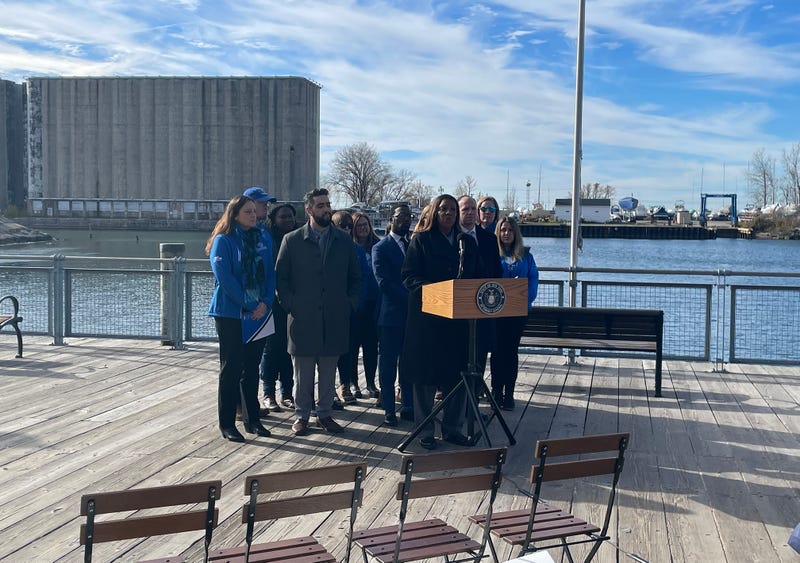
Buffalo, N.Y. (WBEN) - New York Attorney General Letitia James was in the City of Buffalo on Wednesday to announced the historic filing of a groundbreaking lawsuit against PepsiCo Inc. (PepsiCo) for harming the public and the environment with its single-use plastic packaging.
The Attorney General's Office found that single-use plastic produced by PepsiCo contributes significantly to high levels of plastic pollution along the Buffalo River, pollution that is contaminating drinking water and harming wildlife.
"Every New Yorker has a right to clean air, clean water and a healthy environment. All communities. That's not just a value statement, that's enshrined in our Constitution," said Attorney General James on Wednesday along Buffalo's Waterfront at Canalside. "Today we are taking significant action to protect that right for our families here in Buffalo and our communities across New York."
The lawsuit alleges that PepsiCo substantially causes public harm in Buffalo, has failed to warn consumers about the potential health and environmental risks of its single-use plastic packaging, and misleads consumers and the public about its efforts to combat plastic pollution.
Through this lawsuit, Attorney General James seeks to require PepsiCo to end practices that threaten the environment and the public, and to obtain disgorgement, civil penalties, and restitution for the damage inflicted upon New York’s communities and environment.
"We must hold companies that are harming our environment and our residents accountable. This truly is a historic step in holding large companies accountable, but it's one that we must take," James said.
PepsiCo, which is headquartered in New York State, manufactures, produces, and packages, at least, 85 different beverage brands and 25 snack food brands that predominantly come in single-use plastic containers.
Plastic packaging has become a persistent and dangerous form of pollution along the shores of the Buffalo River and in its watershed. In 2022, Attorney General's Office conducted a survey of all types of waste collected at 13 sites along the Buffalo River and its tributaries, and found that PepsiCo’s single-use plastic packaging was the most significant.
Of the 1,916 pieces of plastic trash collected with an identifiable brand, over 17% were produced by PepsiCo. PepsiCo’s plastic packaging far exceeded any other source of this identifiable plastic waste along the river, and it was three times more abundant than the next highest contributor.
From 2013 to 2022, approximately 78% of waste collected by Buffalo Niagara Waterkeeper volunteers in the Buffalo River watershed was plastic. Single-use plastic packaging for food and beverages, including food wrappers, plastic bottles, and bottle caps of the types produced by PepsiCo, were found in significant amounts every year. Once in the environment, single-use plastic packaging quickly starts to break down and release dangerous microplastics.
Large quantities of microplastics have been found in the Buffalo River, and an analysis of those fragments has confirmed the presence of microplastics from snack food wrappers and polymers of the type used in PepsiCo’s plastic beverage bottles and bottle caps.
Plastic pollution along the Buffalo River poses wide-ranging public health and environmental threats. The City of Buffalo sources its drinking water from Lake Erie, less than a mile from the mouth of the Buffalo River, and microplastics have been detected in the city’s drinking water supply.
Microplastics have also been detected in fish species that are known to inhabit Lake Erie and the Buffalo River, many of which are food sources for the local community.
Humans consume microplastics that contaminate our food and water. Once ingested, microplastics permeate deep into our bodies, blood, and organs, and can even be transferred through the placenta into unborn children. Exposure to microplastics and the chemicals they carry can cause a wide range of adverse health effects, from reproductive dysfunction to inflammation of the intestine and neurotoxic effects.
In addition to negative effects on human health, research surrounding the impact of plastic and microplastic pollution shows negative impacts occurring on a wide range of species living in freshwater and terrestrial habitats due to exposure to various plastic polymers.
Microplastics contaminate every level of the food web in the Great Lakes, and both plastic fragments and the chemicals they carry can bioaccumulate in freshwater species. At least 206 freshwater species have been found to ingest or become entangled in plastic, with many adverse and even lethal effects.
The lawsuit alleges PepsiCo of significantly contributing to, and continuing to contribute to the existence of a public nuisance that injures the community living in the City of Buffalo and the environment. PepsiCo has also misled the public about the effectiveness of its plastic recycling and its efforts to combat plastic pollution.
Attorney General James also charges that PepsiCo failed to warn its consumers about the risk of harm to human health and the environment posed by its packaging.
Through this lawsuit, Attorney General James is asking the court to require PepsiCo to cease contributing to the public nuisance it is causing in the Buffalo region, remediate the contamination it caused, and identify and implement measures to reduce the quantity of PepsiCo’s plastic packaging entering the Buffalo River.
The lawsuit further seeks to stop PepsiCo from selling or distributing any product in the Buffalo region in single-use plastic packaging that does not contain an adequate warning. The lawsuit also seeks disgorgement, civil penalties, and restitution.
